Psychotropic Drugs: An Analysis of Their Role as Useful Medicines
VerifiedAdded on 2022/10/19
|12
|3889
|291
Essay
AI Summary
This essay delves into the multifaceted world of psychotropic drugs, examining their role as potential medicines for various mental health conditions. It begins by providing background information on the historical context and significance of psychotropic drugs, setting the stage for a detailed discussion of their application in treating disorders such as depression, anxiety, bipolar disorder, and schizophrenia. The essay explores the different types of psychotropic medications, including antidepressants, antipsychotics, anxiolytics, mood stabilizers, and stimulants, discussing their mechanisms of action and the specific conditions they are used to treat. It also addresses the potential benefits and risks associated with these drugs, including side effects and the importance of appropriate use. The essay further examines the role of psychotropic drugs in conjunction with psychotherapy and other treatment modalities. The conclusion summarizes the key findings and suggests future directions for research and clinical practice in the field of psychopharmacology.

Drugs and social
Paraphrase This Document
Need a fresh take? Get an instant paraphrase of this document with our AI Paraphraser

Drugs and social 1
Contents
Background information........................................................................................................................2
Main discussion.....................................................................................................................................2
Conclusion.............................................................................................................................................6
References.............................................................................................................................................9
Contents
Background information........................................................................................................................2
Main discussion.....................................................................................................................................2
Conclusion.............................................................................................................................................6
References.............................................................................................................................................9
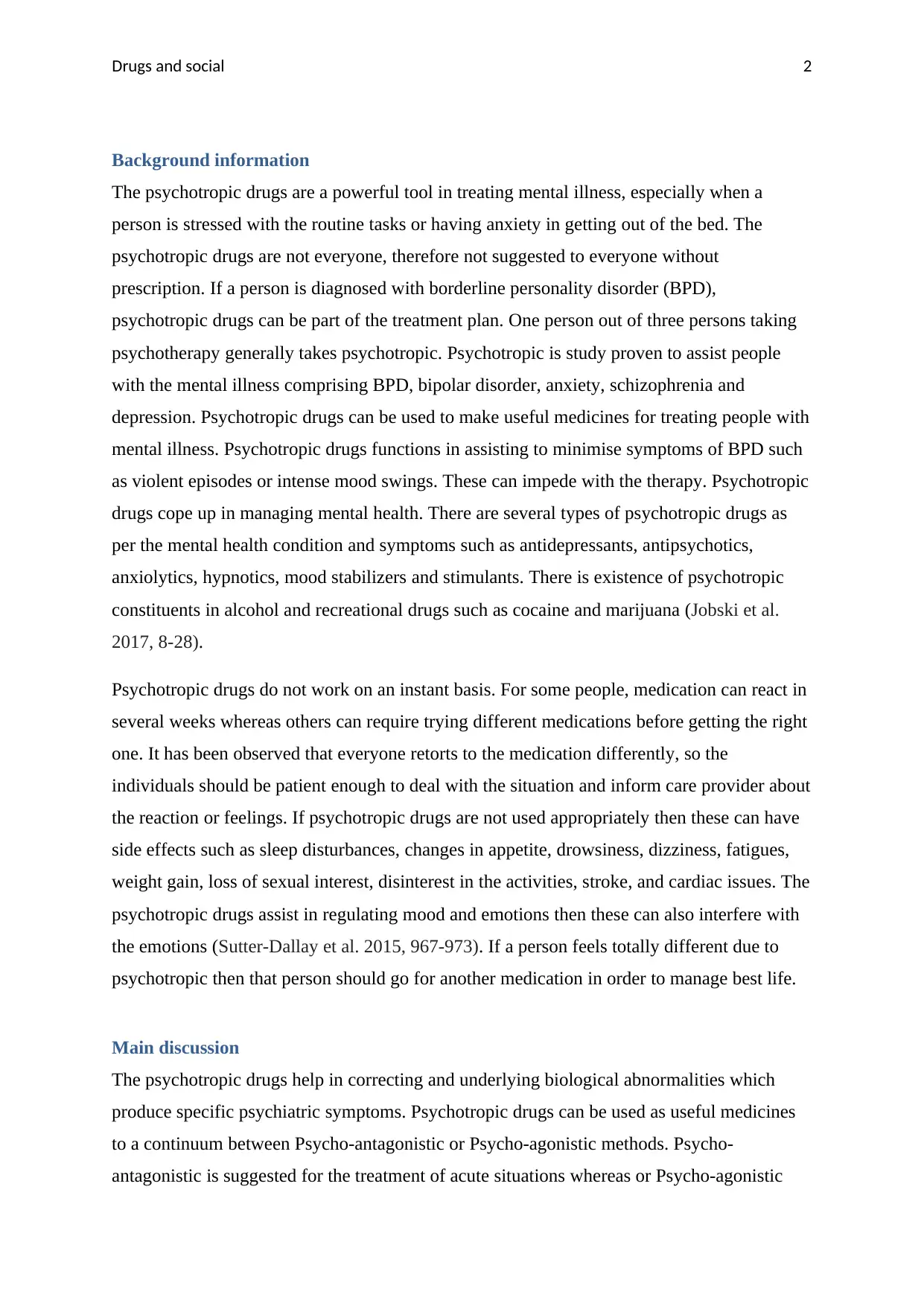
Drugs and social 2
Background information
The psychotropic drugs are a powerful tool in treating mental illness, especially when a
person is stressed with the routine tasks or having anxiety in getting out of the bed. The
psychotropic drugs are not everyone, therefore not suggested to everyone without
prescription. If a person is diagnosed with borderline personality disorder (BPD),
psychotropic drugs can be part of the treatment plan. One person out of three persons taking
psychotherapy generally takes psychotropic. Psychotropic is study proven to assist people
with the mental illness comprising BPD, bipolar disorder, anxiety, schizophrenia and
depression. Psychotropic drugs can be used to make useful medicines for treating people with
mental illness. Psychotropic drugs functions in assisting to minimise symptoms of BPD such
as violent episodes or intense mood swings. These can impede with the therapy. Psychotropic
drugs cope up in managing mental health. There are several types of psychotropic drugs as
per the mental health condition and symptoms such as antidepressants, antipsychotics,
anxiolytics, hypnotics, mood stabilizers and stimulants. There is existence of psychotropic
constituents in alcohol and recreational drugs such as cocaine and marijuana (Jobski et al.
2017, 8-28).
Psychotropic drugs do not work on an instant basis. For some people, medication can react in
several weeks whereas others can require trying different medications before getting the right
one. It has been observed that everyone retorts to the medication differently, so the
individuals should be patient enough to deal with the situation and inform care provider about
the reaction or feelings. If psychotropic drugs are not used appropriately then these can have
side effects such as sleep disturbances, changes in appetite, drowsiness, dizziness, fatigues,
weight gain, loss of sexual interest, disinterest in the activities, stroke, and cardiac issues. The
psychotropic drugs assist in regulating mood and emotions then these can also interfere with
the emotions (Sutter-Dallay et al. 2015, 967-973). If a person feels totally different due to
psychotropic then that person should go for another medication in order to manage best life.
Main discussion
The psychotropic drugs help in correcting and underlying biological abnormalities which
produce specific psychiatric symptoms. Psychotropic drugs can be used as useful medicines
to a continuum between Psycho-antagonistic or Psycho-agonistic methods. Psycho-
antagonistic is suggested for the treatment of acute situations whereas or Psycho-agonistic
Background information
The psychotropic drugs are a powerful tool in treating mental illness, especially when a
person is stressed with the routine tasks or having anxiety in getting out of the bed. The
psychotropic drugs are not everyone, therefore not suggested to everyone without
prescription. If a person is diagnosed with borderline personality disorder (BPD),
psychotropic drugs can be part of the treatment plan. One person out of three persons taking
psychotherapy generally takes psychotropic. Psychotropic is study proven to assist people
with the mental illness comprising BPD, bipolar disorder, anxiety, schizophrenia and
depression. Psychotropic drugs can be used to make useful medicines for treating people with
mental illness. Psychotropic drugs functions in assisting to minimise symptoms of BPD such
as violent episodes or intense mood swings. These can impede with the therapy. Psychotropic
drugs cope up in managing mental health. There are several types of psychotropic drugs as
per the mental health condition and symptoms such as antidepressants, antipsychotics,
anxiolytics, hypnotics, mood stabilizers and stimulants. There is existence of psychotropic
constituents in alcohol and recreational drugs such as cocaine and marijuana (Jobski et al.
2017, 8-28).
Psychotropic drugs do not work on an instant basis. For some people, medication can react in
several weeks whereas others can require trying different medications before getting the right
one. It has been observed that everyone retorts to the medication differently, so the
individuals should be patient enough to deal with the situation and inform care provider about
the reaction or feelings. If psychotropic drugs are not used appropriately then these can have
side effects such as sleep disturbances, changes in appetite, drowsiness, dizziness, fatigues,
weight gain, loss of sexual interest, disinterest in the activities, stroke, and cardiac issues. The
psychotropic drugs assist in regulating mood and emotions then these can also interfere with
the emotions (Sutter-Dallay et al. 2015, 967-973). If a person feels totally different due to
psychotropic then that person should go for another medication in order to manage best life.
Main discussion
The psychotropic drugs help in correcting and underlying biological abnormalities which
produce specific psychiatric symptoms. Psychotropic drugs can be used as useful medicines
to a continuum between Psycho-antagonistic or Psycho-agonistic methods. Psycho-
antagonistic is suggested for the treatment of acute situations whereas or Psycho-agonistic
⊘ This is a preview!⊘
Do you want full access?
Subscribe today to unlock all pages.

Trusted by 1+ million students worldwide
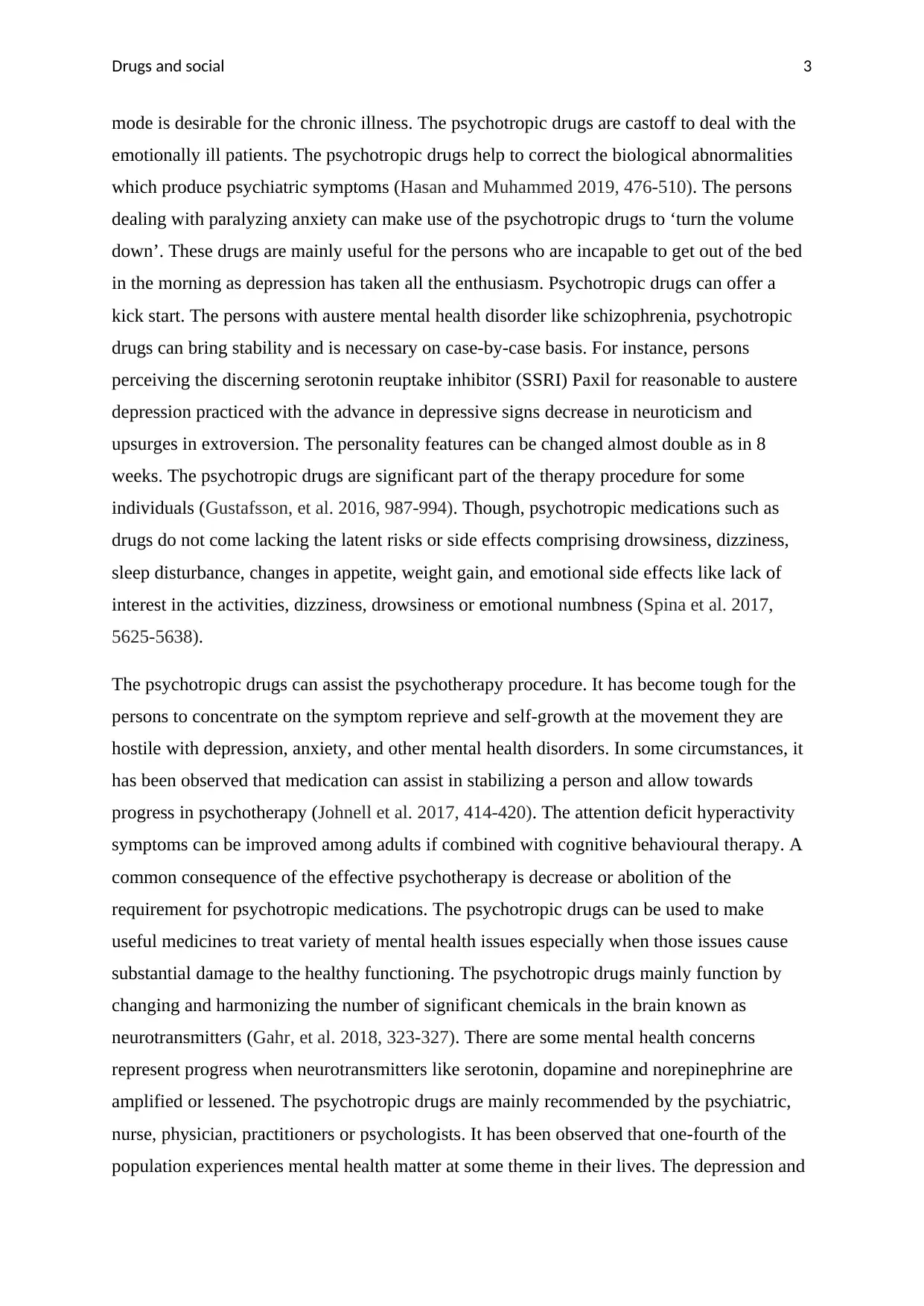
Drugs and social 3
mode is desirable for the chronic illness. The psychotropic drugs are castoff to deal with the
emotionally ill patients. The psychotropic drugs help to correct the biological abnormalities
which produce psychiatric symptoms (Hasan and Muhammed 2019, 476-510). The persons
dealing with paralyzing anxiety can make use of the psychotropic drugs to ‘turn the volume
down’. These drugs are mainly useful for the persons who are incapable to get out of the bed
in the morning as depression has taken all the enthusiasm. Psychotropic drugs can offer a
kick start. The persons with austere mental health disorder like schizophrenia, psychotropic
drugs can bring stability and is necessary on case-by-case basis. For instance, persons
perceiving the discerning serotonin reuptake inhibitor (SSRI) Paxil for reasonable to austere
depression practiced with the advance in depressive signs decrease in neuroticism and
upsurges in extroversion. The personality features can be changed almost double as in 8
weeks. The psychotropic drugs are significant part of the therapy procedure for some
individuals (Gustafsson, et al. 2016, 987-994). Though, psychotropic medications such as
drugs do not come lacking the latent risks or side effects comprising drowsiness, dizziness,
sleep disturbance, changes in appetite, weight gain, and emotional side effects like lack of
interest in the activities, dizziness, drowsiness or emotional numbness (Spina et al. 2017,
5625-5638).
The psychotropic drugs can assist the psychotherapy procedure. It has become tough for the
persons to concentrate on the symptom reprieve and self-growth at the movement they are
hostile with depression, anxiety, and other mental health disorders. In some circumstances, it
has been observed that medication can assist in stabilizing a person and allow towards
progress in psychotherapy (Johnell et al. 2017, 414-420). The attention deficit hyperactivity
symptoms can be improved among adults if combined with cognitive behavioural therapy. A
common consequence of the effective psychotherapy is decrease or abolition of the
requirement for psychotropic medications. The psychotropic drugs can be used to make
useful medicines to treat variety of mental health issues especially when those issues cause
substantial damage to the healthy functioning. The psychotropic drugs mainly function by
changing and harmonizing the number of significant chemicals in the brain known as
neurotransmitters (Gahr, et al. 2018, 323-327). There are some mental health concerns
represent progress when neurotransmitters like serotonin, dopamine and norepinephrine are
amplified or lessened. The psychotropic drugs are mainly recommended by the psychiatric,
nurse, physician, practitioners or psychologists. It has been observed that one-fourth of the
population experiences mental health matter at some theme in their lives. The depression and
mode is desirable for the chronic illness. The psychotropic drugs are castoff to deal with the
emotionally ill patients. The psychotropic drugs help to correct the biological abnormalities
which produce psychiatric symptoms (Hasan and Muhammed 2019, 476-510). The persons
dealing with paralyzing anxiety can make use of the psychotropic drugs to ‘turn the volume
down’. These drugs are mainly useful for the persons who are incapable to get out of the bed
in the morning as depression has taken all the enthusiasm. Psychotropic drugs can offer a
kick start. The persons with austere mental health disorder like schizophrenia, psychotropic
drugs can bring stability and is necessary on case-by-case basis. For instance, persons
perceiving the discerning serotonin reuptake inhibitor (SSRI) Paxil for reasonable to austere
depression practiced with the advance in depressive signs decrease in neuroticism and
upsurges in extroversion. The personality features can be changed almost double as in 8
weeks. The psychotropic drugs are significant part of the therapy procedure for some
individuals (Gustafsson, et al. 2016, 987-994). Though, psychotropic medications such as
drugs do not come lacking the latent risks or side effects comprising drowsiness, dizziness,
sleep disturbance, changes in appetite, weight gain, and emotional side effects like lack of
interest in the activities, dizziness, drowsiness or emotional numbness (Spina et al. 2017,
5625-5638).
The psychotropic drugs can assist the psychotherapy procedure. It has become tough for the
persons to concentrate on the symptom reprieve and self-growth at the movement they are
hostile with depression, anxiety, and other mental health disorders. In some circumstances, it
has been observed that medication can assist in stabilizing a person and allow towards
progress in psychotherapy (Johnell et al. 2017, 414-420). The attention deficit hyperactivity
symptoms can be improved among adults if combined with cognitive behavioural therapy. A
common consequence of the effective psychotherapy is decrease or abolition of the
requirement for psychotropic medications. The psychotropic drugs can be used to make
useful medicines to treat variety of mental health issues especially when those issues cause
substantial damage to the healthy functioning. The psychotropic drugs mainly function by
changing and harmonizing the number of significant chemicals in the brain known as
neurotransmitters (Gahr, et al. 2018, 323-327). There are some mental health concerns
represent progress when neurotransmitters like serotonin, dopamine and norepinephrine are
amplified or lessened. The psychotropic drugs are mainly recommended by the psychiatric,
nurse, physician, practitioners or psychologists. It has been observed that one-fourth of the
population experiences mental health matter at some theme in their lives. The depression and
Paraphrase This Document
Need a fresh take? Get an instant paraphrase of this document with our AI Paraphraser
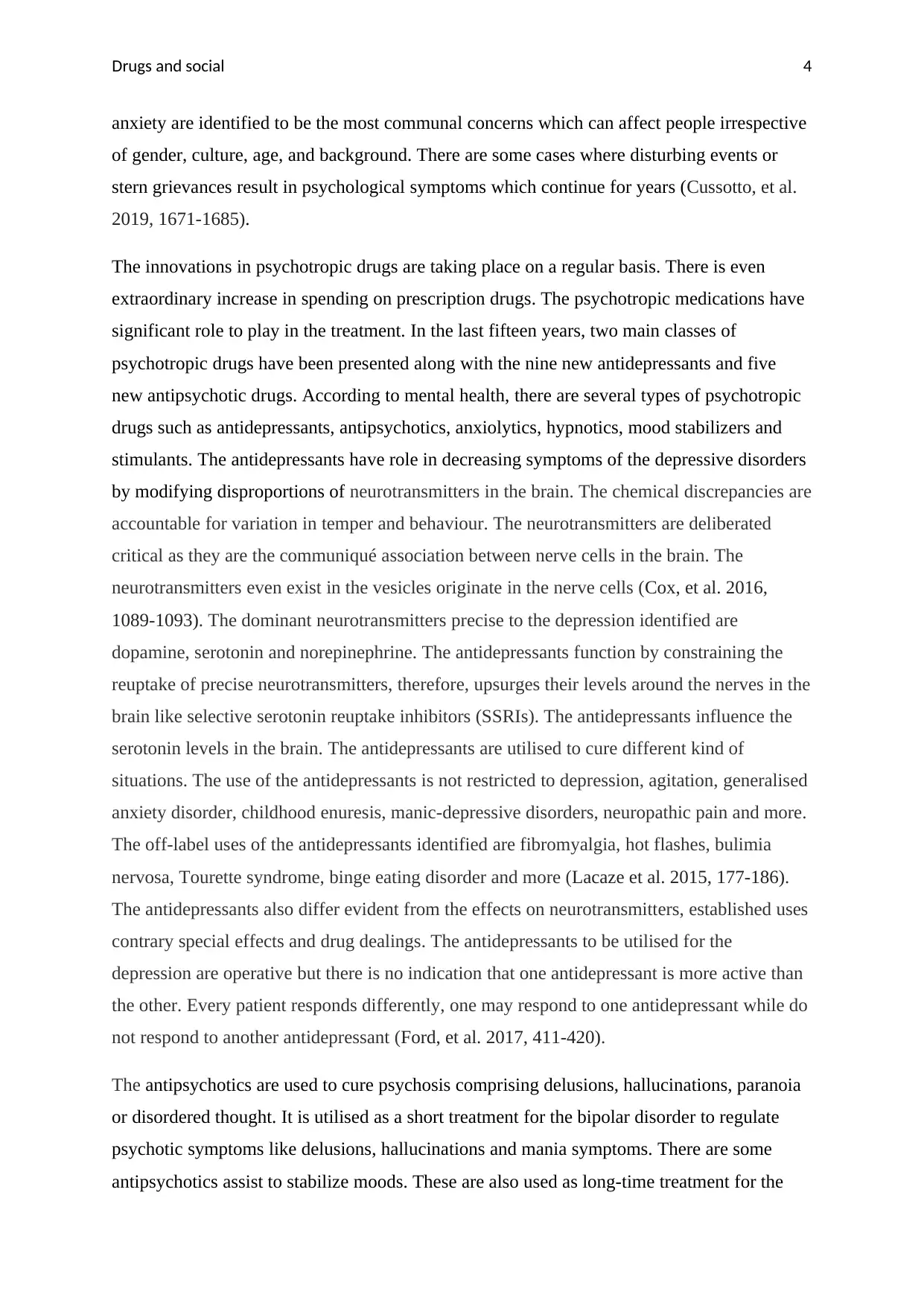
Drugs and social 4
anxiety are identified to be the most communal concerns which can affect people irrespective
of gender, culture, age, and background. There are some cases where disturbing events or
stern grievances result in psychological symptoms which continue for years (Cussotto, et al.
2019, 1671-1685).
The innovations in psychotropic drugs are taking place on a regular basis. There is even
extraordinary increase in spending on prescription drugs. The psychotropic medications have
significant role to play in the treatment. In the last fifteen years, two main classes of
psychotropic drugs have been presented along with the nine new antidepressants and five
new antipsychotic drugs. According to mental health, there are several types of psychotropic
drugs such as antidepressants, antipsychotics, anxiolytics, hypnotics, mood stabilizers and
stimulants. The antidepressants have role in decreasing symptoms of the depressive disorders
by modifying disproportions of neurotransmitters in the brain. The chemical discrepancies are
accountable for variation in temper and behaviour. The neurotransmitters are deliberated
critical as they are the communiqué association between nerve cells in the brain. The
neurotransmitters even exist in the vesicles originate in the nerve cells (Cox, et al. 2016,
1089-1093). The dominant neurotransmitters precise to the depression identified are
dopamine, serotonin and norepinephrine. The antidepressants function by constraining the
reuptake of precise neurotransmitters, therefore, upsurges their levels around the nerves in the
brain like selective serotonin reuptake inhibitors (SSRIs). The antidepressants influence the
serotonin levels in the brain. The antidepressants are utilised to cure different kind of
situations. The use of the antidepressants is not restricted to depression, agitation, generalised
anxiety disorder, childhood enuresis, manic-depressive disorders, neuropathic pain and more.
The off-label uses of the antidepressants identified are fibromyalgia, hot flashes, bulimia
nervosa, Tourette syndrome, binge eating disorder and more (Lacaze et al. 2015, 177-186).
The antidepressants also differ evident from the effects on neurotransmitters, established uses
contrary special effects and drug dealings. The antidepressants to be utilised for the
depression are operative but there is no indication that one antidepressant is more active than
the other. Every patient responds differently, one may respond to one antidepressant while do
not respond to another antidepressant (Ford, et al. 2017, 411-420).
The antipsychotics are used to cure psychosis comprising delusions, hallucinations, paranoia
or disordered thought. It is utilised as a short treatment for the bipolar disorder to regulate
psychotic symptoms like delusions, hallucinations and mania symptoms. There are some
antipsychotics assist to stabilize moods. These are also used as long-time treatment for the
anxiety are identified to be the most communal concerns which can affect people irrespective
of gender, culture, age, and background. There are some cases where disturbing events or
stern grievances result in psychological symptoms which continue for years (Cussotto, et al.
2019, 1671-1685).
The innovations in psychotropic drugs are taking place on a regular basis. There is even
extraordinary increase in spending on prescription drugs. The psychotropic medications have
significant role to play in the treatment. In the last fifteen years, two main classes of
psychotropic drugs have been presented along with the nine new antidepressants and five
new antipsychotic drugs. According to mental health, there are several types of psychotropic
drugs such as antidepressants, antipsychotics, anxiolytics, hypnotics, mood stabilizers and
stimulants. The antidepressants have role in decreasing symptoms of the depressive disorders
by modifying disproportions of neurotransmitters in the brain. The chemical discrepancies are
accountable for variation in temper and behaviour. The neurotransmitters are deliberated
critical as they are the communiqué association between nerve cells in the brain. The
neurotransmitters even exist in the vesicles originate in the nerve cells (Cox, et al. 2016,
1089-1093). The dominant neurotransmitters precise to the depression identified are
dopamine, serotonin and norepinephrine. The antidepressants function by constraining the
reuptake of precise neurotransmitters, therefore, upsurges their levels around the nerves in the
brain like selective serotonin reuptake inhibitors (SSRIs). The antidepressants influence the
serotonin levels in the brain. The antidepressants are utilised to cure different kind of
situations. The use of the antidepressants is not restricted to depression, agitation, generalised
anxiety disorder, childhood enuresis, manic-depressive disorders, neuropathic pain and more.
The off-label uses of the antidepressants identified are fibromyalgia, hot flashes, bulimia
nervosa, Tourette syndrome, binge eating disorder and more (Lacaze et al. 2015, 177-186).
The antidepressants also differ evident from the effects on neurotransmitters, established uses
contrary special effects and drug dealings. The antidepressants to be utilised for the
depression are operative but there is no indication that one antidepressant is more active than
the other. Every patient responds differently, one may respond to one antidepressant while do
not respond to another antidepressant (Ford, et al. 2017, 411-420).
The antipsychotics are used to cure psychosis comprising delusions, hallucinations, paranoia
or disordered thought. It is utilised as a short treatment for the bipolar disorder to regulate
psychotic symptoms like delusions, hallucinations and mania symptoms. There are some
antipsychotics assist to stabilize moods. These are also used as long-time treatment for the
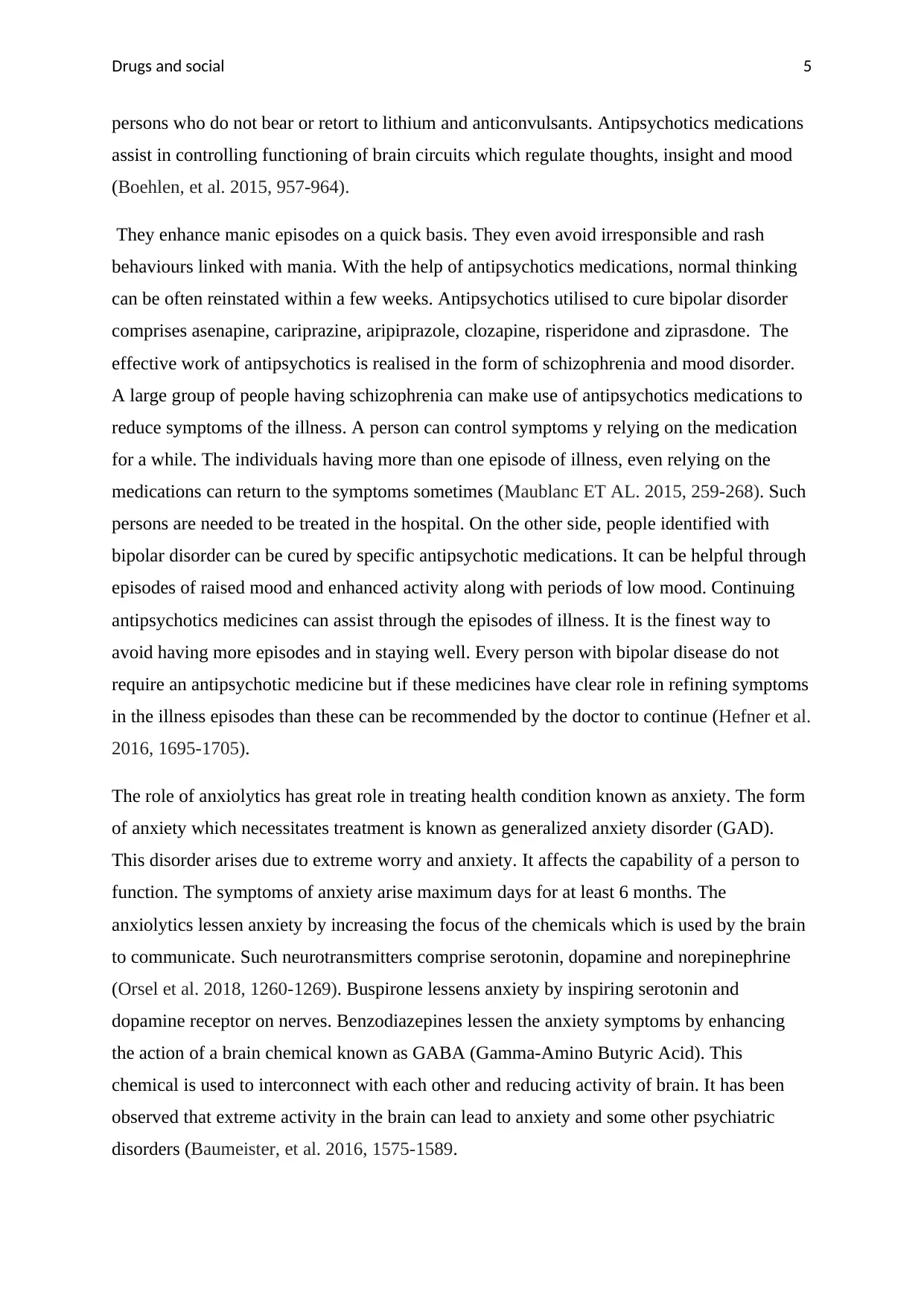
Drugs and social 5
persons who do not bear or retort to lithium and anticonvulsants. Antipsychotics medications
assist in controlling functioning of brain circuits which regulate thoughts, insight and mood
(Boehlen, et al. 2015, 957-964).
They enhance manic episodes on a quick basis. They even avoid irresponsible and rash
behaviours linked with mania. With the help of antipsychotics medications, normal thinking
can be often reinstated within a few weeks. Antipsychotics utilised to cure bipolar disorder
comprises asenapine, cariprazine, aripiprazole, clozapine, risperidone and ziprasdone. The
effective work of antipsychotics is realised in the form of schizophrenia and mood disorder.
A large group of people having schizophrenia can make use of antipsychotics medications to
reduce symptoms of the illness. A person can control symptoms y relying on the medication
for a while. The individuals having more than one episode of illness, even relying on the
medications can return to the symptoms sometimes (Maublanc ET AL. 2015, 259-268). Such
persons are needed to be treated in the hospital. On the other side, people identified with
bipolar disorder can be cured by specific antipsychotic medications. It can be helpful through
episodes of raised mood and enhanced activity along with periods of low mood. Continuing
antipsychotics medicines can assist through the episodes of illness. It is the finest way to
avoid having more episodes and in staying well. Every person with bipolar disease do not
require an antipsychotic medicine but if these medicines have clear role in refining symptoms
in the illness episodes than these can be recommended by the doctor to continue (Hefner et al.
2016, 1695-1705).
The role of anxiolytics has great role in treating health condition known as anxiety. The form
of anxiety which necessitates treatment is known as generalized anxiety disorder (GAD).
This disorder arises due to extreme worry and anxiety. It affects the capability of a person to
function. The symptoms of anxiety arise maximum days for at least 6 months. The
anxiolytics lessen anxiety by increasing the focus of the chemicals which is used by the brain
to communicate. Such neurotransmitters comprise serotonin, dopamine and norepinephrine
(Orsel et al. 2018, 1260-1269). Buspirone lessens anxiety by inspiring serotonin and
dopamine receptor on nerves. Benzodiazepines lessen the anxiety symptoms by enhancing
the action of a brain chemical known as GABA (Gamma-Amino Butyric Acid). This
chemical is used to interconnect with each other and reducing activity of brain. It has been
observed that extreme activity in the brain can lead to anxiety and some other psychiatric
disorders (Baumeister, et al. 2016, 1575-1589.
persons who do not bear or retort to lithium and anticonvulsants. Antipsychotics medications
assist in controlling functioning of brain circuits which regulate thoughts, insight and mood
(Boehlen, et al. 2015, 957-964).
They enhance manic episodes on a quick basis. They even avoid irresponsible and rash
behaviours linked with mania. With the help of antipsychotics medications, normal thinking
can be often reinstated within a few weeks. Antipsychotics utilised to cure bipolar disorder
comprises asenapine, cariprazine, aripiprazole, clozapine, risperidone and ziprasdone. The
effective work of antipsychotics is realised in the form of schizophrenia and mood disorder.
A large group of people having schizophrenia can make use of antipsychotics medications to
reduce symptoms of the illness. A person can control symptoms y relying on the medication
for a while. The individuals having more than one episode of illness, even relying on the
medications can return to the symptoms sometimes (Maublanc ET AL. 2015, 259-268). Such
persons are needed to be treated in the hospital. On the other side, people identified with
bipolar disorder can be cured by specific antipsychotic medications. It can be helpful through
episodes of raised mood and enhanced activity along with periods of low mood. Continuing
antipsychotics medicines can assist through the episodes of illness. It is the finest way to
avoid having more episodes and in staying well. Every person with bipolar disease do not
require an antipsychotic medicine but if these medicines have clear role in refining symptoms
in the illness episodes than these can be recommended by the doctor to continue (Hefner et al.
2016, 1695-1705).
The role of anxiolytics has great role in treating health condition known as anxiety. The form
of anxiety which necessitates treatment is known as generalized anxiety disorder (GAD).
This disorder arises due to extreme worry and anxiety. It affects the capability of a person to
function. The symptoms of anxiety arise maximum days for at least 6 months. The
anxiolytics lessen anxiety by increasing the focus of the chemicals which is used by the brain
to communicate. Such neurotransmitters comprise serotonin, dopamine and norepinephrine
(Orsel et al. 2018, 1260-1269). Buspirone lessens anxiety by inspiring serotonin and
dopamine receptor on nerves. Benzodiazepines lessen the anxiety symptoms by enhancing
the action of a brain chemical known as GABA (Gamma-Amino Butyric Acid). This
chemical is used to interconnect with each other and reducing activity of brain. It has been
observed that extreme activity in the brain can lead to anxiety and some other psychiatric
disorders (Baumeister, et al. 2016, 1575-1589.
⊘ This is a preview!⊘
Do you want full access?
Subscribe today to unlock all pages.

Trusted by 1+ million students worldwide
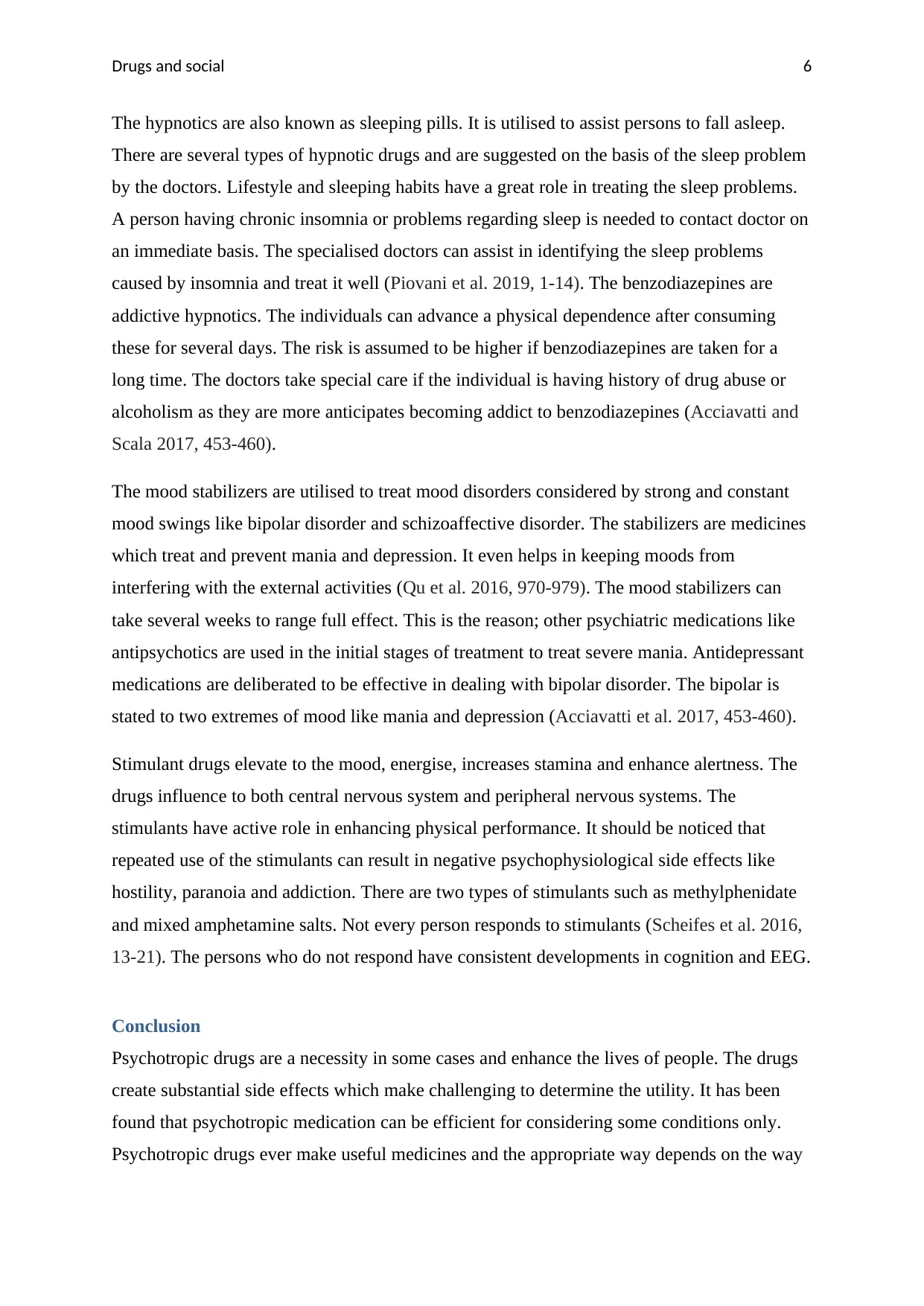
Drugs and social 6
The hypnotics are also known as sleeping pills. It is utilised to assist persons to fall asleep.
There are several types of hypnotic drugs and are suggested on the basis of the sleep problem
by the doctors. Lifestyle and sleeping habits have a great role in treating the sleep problems.
A person having chronic insomnia or problems regarding sleep is needed to contact doctor on
an immediate basis. The specialised doctors can assist in identifying the sleep problems
caused by insomnia and treat it well (Piovani et al. 2019, 1-14). The benzodiazepines are
addictive hypnotics. The individuals can advance a physical dependence after consuming
these for several days. The risk is assumed to be higher if benzodiazepines are taken for a
long time. The doctors take special care if the individual is having history of drug abuse or
alcoholism as they are more anticipates becoming addict to benzodiazepines (Acciavatti and
Scala 2017, 453-460).
The mood stabilizers are utilised to treat mood disorders considered by strong and constant
mood swings like bipolar disorder and schizoaffective disorder. The stabilizers are medicines
which treat and prevent mania and depression. It even helps in keeping moods from
interfering with the external activities (Qu et al. 2016, 970-979). The mood stabilizers can
take several weeks to range full effect. This is the reason; other psychiatric medications like
antipsychotics are used in the initial stages of treatment to treat severe mania. Antidepressant
medications are deliberated to be effective in dealing with bipolar disorder. The bipolar is
stated to two extremes of mood like mania and depression (Acciavatti et al. 2017, 453-460).
Stimulant drugs elevate to the mood, energise, increases stamina and enhance alertness. The
drugs influence to both central nervous system and peripheral nervous systems. The
stimulants have active role in enhancing physical performance. It should be noticed that
repeated use of the stimulants can result in negative psychophysiological side effects like
hostility, paranoia and addiction. There are two types of stimulants such as methylphenidate
and mixed amphetamine salts. Not every person responds to stimulants (Scheifes et al. 2016,
13-21). The persons who do not respond have consistent developments in cognition and EEG.
Conclusion
Psychotropic drugs are a necessity in some cases and enhance the lives of people. The drugs
create substantial side effects which make challenging to determine the utility. It has been
found that psychotropic medication can be efficient for considering some conditions only.
Psychotropic drugs ever make useful medicines and the appropriate way depends on the way
The hypnotics are also known as sleeping pills. It is utilised to assist persons to fall asleep.
There are several types of hypnotic drugs and are suggested on the basis of the sleep problem
by the doctors. Lifestyle and sleeping habits have a great role in treating the sleep problems.
A person having chronic insomnia or problems regarding sleep is needed to contact doctor on
an immediate basis. The specialised doctors can assist in identifying the sleep problems
caused by insomnia and treat it well (Piovani et al. 2019, 1-14). The benzodiazepines are
addictive hypnotics. The individuals can advance a physical dependence after consuming
these for several days. The risk is assumed to be higher if benzodiazepines are taken for a
long time. The doctors take special care if the individual is having history of drug abuse or
alcoholism as they are more anticipates becoming addict to benzodiazepines (Acciavatti and
Scala 2017, 453-460).
The mood stabilizers are utilised to treat mood disorders considered by strong and constant
mood swings like bipolar disorder and schizoaffective disorder. The stabilizers are medicines
which treat and prevent mania and depression. It even helps in keeping moods from
interfering with the external activities (Qu et al. 2016, 970-979). The mood stabilizers can
take several weeks to range full effect. This is the reason; other psychiatric medications like
antipsychotics are used in the initial stages of treatment to treat severe mania. Antidepressant
medications are deliberated to be effective in dealing with bipolar disorder. The bipolar is
stated to two extremes of mood like mania and depression (Acciavatti et al. 2017, 453-460).
Stimulant drugs elevate to the mood, energise, increases stamina and enhance alertness. The
drugs influence to both central nervous system and peripheral nervous systems. The
stimulants have active role in enhancing physical performance. It should be noticed that
repeated use of the stimulants can result in negative psychophysiological side effects like
hostility, paranoia and addiction. There are two types of stimulants such as methylphenidate
and mixed amphetamine salts. Not every person responds to stimulants (Scheifes et al. 2016,
13-21). The persons who do not respond have consistent developments in cognition and EEG.
Conclusion
Psychotropic drugs are a necessity in some cases and enhance the lives of people. The drugs
create substantial side effects which make challenging to determine the utility. It has been
found that psychotropic medication can be efficient for considering some conditions only.
Psychotropic drugs ever make useful medicines and the appropriate way depends on the way
Paraphrase This Document
Need a fresh take? Get an instant paraphrase of this document with our AI Paraphraser
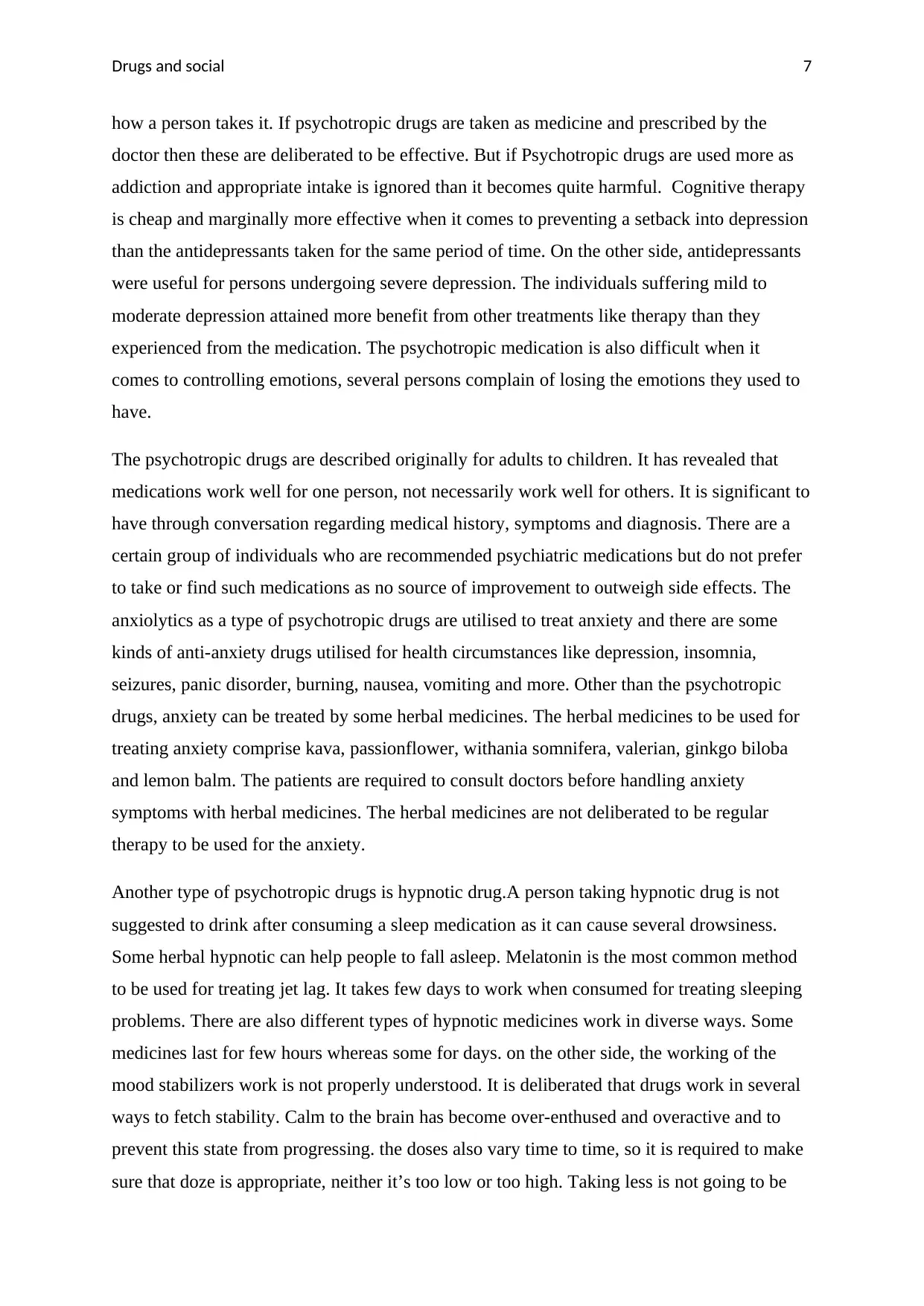
Drugs and social 7
how a person takes it. If psychotropic drugs are taken as medicine and prescribed by the
doctor then these are deliberated to be effective. But if Psychotropic drugs are used more as
addiction and appropriate intake is ignored than it becomes quite harmful. Cognitive therapy
is cheap and marginally more effective when it comes to preventing a setback into depression
than the antidepressants taken for the same period of time. On the other side, antidepressants
were useful for persons undergoing severe depression. The individuals suffering mild to
moderate depression attained more benefit from other treatments like therapy than they
experienced from the medication. The psychotropic medication is also difficult when it
comes to controlling emotions, several persons complain of losing the emotions they used to
have.
The psychotropic drugs are described originally for adults to children. It has revealed that
medications work well for one person, not necessarily work well for others. It is significant to
have through conversation regarding medical history, symptoms and diagnosis. There are a
certain group of individuals who are recommended psychiatric medications but do not prefer
to take or find such medications as no source of improvement to outweigh side effects. The
anxiolytics as a type of psychotropic drugs are utilised to treat anxiety and there are some
kinds of anti-anxiety drugs utilised for health circumstances like depression, insomnia,
seizures, panic disorder, burning, nausea, vomiting and more. Other than the psychotropic
drugs, anxiety can be treated by some herbal medicines. The herbal medicines to be used for
treating anxiety comprise kava, passionflower, withania somnifera, valerian, ginkgo biloba
and lemon balm. The patients are required to consult doctors before handling anxiety
symptoms with herbal medicines. The herbal medicines are not deliberated to be regular
therapy to be used for the anxiety.
Another type of psychotropic drugs is hypnotic drug.A person taking hypnotic drug is not
suggested to drink after consuming a sleep medication as it can cause several drowsiness.
Some herbal hypnotic can help people to fall asleep. Melatonin is the most common method
to be used for treating jet lag. It takes few days to work when consumed for treating sleeping
problems. There are also different types of hypnotic medicines work in diverse ways. Some
medicines last for few hours whereas some for days. on the other side, the working of the
mood stabilizers work is not properly understood. It is deliberated that drugs work in several
ways to fetch stability. Calm to the brain has become over-enthused and overactive and to
prevent this state from progressing. the doses also vary time to time, so it is required to make
sure that doze is appropriate, neither it’s too low or too high. Taking less is not going to be
how a person takes it. If psychotropic drugs are taken as medicine and prescribed by the
doctor then these are deliberated to be effective. But if Psychotropic drugs are used more as
addiction and appropriate intake is ignored than it becomes quite harmful. Cognitive therapy
is cheap and marginally more effective when it comes to preventing a setback into depression
than the antidepressants taken for the same period of time. On the other side, antidepressants
were useful for persons undergoing severe depression. The individuals suffering mild to
moderate depression attained more benefit from other treatments like therapy than they
experienced from the medication. The psychotropic medication is also difficult when it
comes to controlling emotions, several persons complain of losing the emotions they used to
have.
The psychotropic drugs are described originally for adults to children. It has revealed that
medications work well for one person, not necessarily work well for others. It is significant to
have through conversation regarding medical history, symptoms and diagnosis. There are a
certain group of individuals who are recommended psychiatric medications but do not prefer
to take or find such medications as no source of improvement to outweigh side effects. The
anxiolytics as a type of psychotropic drugs are utilised to treat anxiety and there are some
kinds of anti-anxiety drugs utilised for health circumstances like depression, insomnia,
seizures, panic disorder, burning, nausea, vomiting and more. Other than the psychotropic
drugs, anxiety can be treated by some herbal medicines. The herbal medicines to be used for
treating anxiety comprise kava, passionflower, withania somnifera, valerian, ginkgo biloba
and lemon balm. The patients are required to consult doctors before handling anxiety
symptoms with herbal medicines. The herbal medicines are not deliberated to be regular
therapy to be used for the anxiety.
Another type of psychotropic drugs is hypnotic drug.A person taking hypnotic drug is not
suggested to drink after consuming a sleep medication as it can cause several drowsiness.
Some herbal hypnotic can help people to fall asleep. Melatonin is the most common method
to be used for treating jet lag. It takes few days to work when consumed for treating sleeping
problems. There are also different types of hypnotic medicines work in diverse ways. Some
medicines last for few hours whereas some for days. on the other side, the working of the
mood stabilizers work is not properly understood. It is deliberated that drugs work in several
ways to fetch stability. Calm to the brain has become over-enthused and overactive and to
prevent this state from progressing. the doses also vary time to time, so it is required to make
sure that doze is appropriate, neither it’s too low or too high. Taking less is not going to be

Drugs and social 8
effective whereas taking more can make a person physically sick. On the other hand, the
stimulants reduce specific risk-prone behaviours and enhance working memory. It also
improves the performance accuracy and intellectual function.
effective whereas taking more can make a person physically sick. On the other hand, the
stimulants reduce specific risk-prone behaviours and enhance working memory. It also
improves the performance accuracy and intellectual function.
⊘ This is a preview!⊘
Do you want full access?
Subscribe today to unlock all pages.

Trusted by 1+ million students worldwide
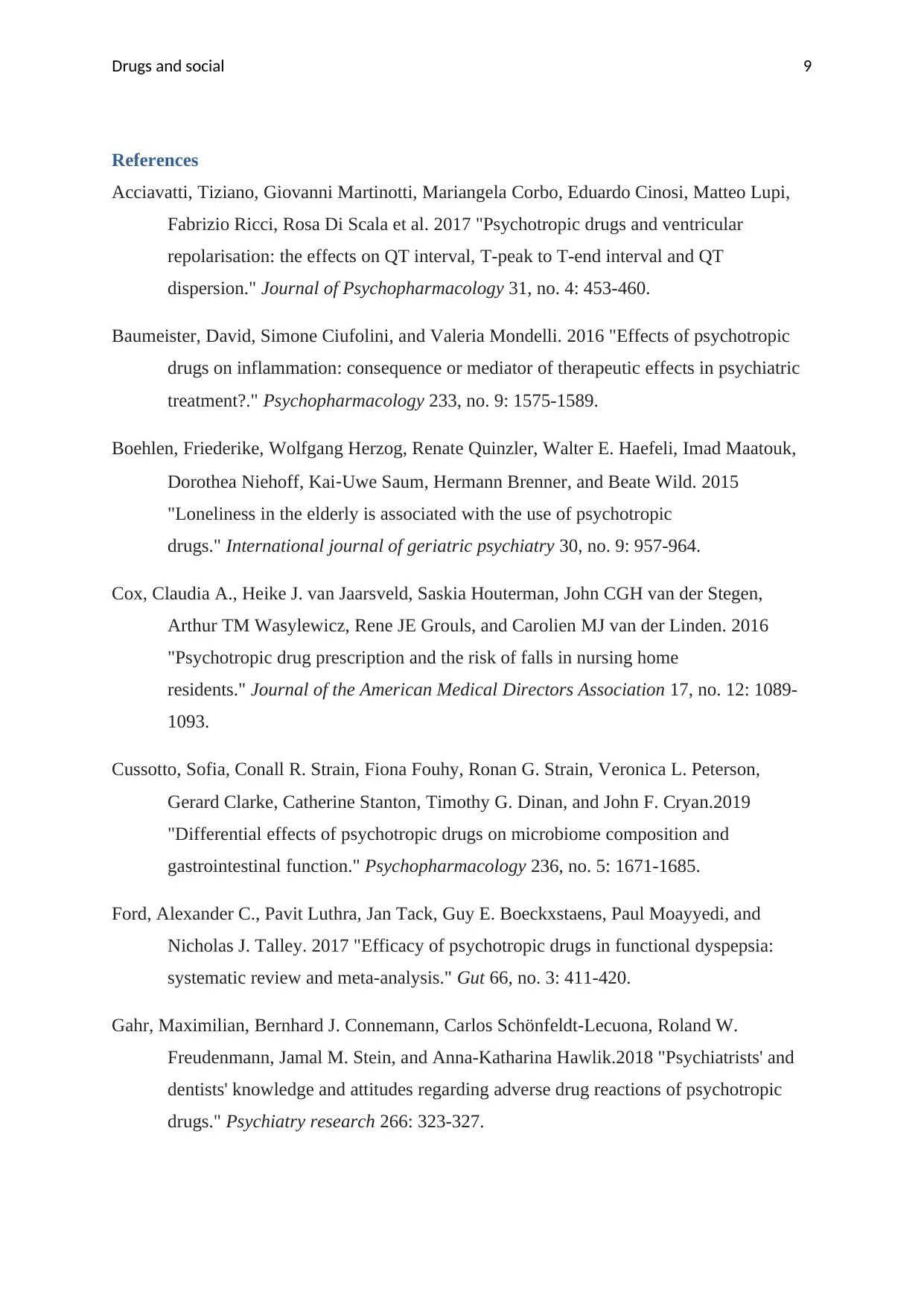
Drugs and social 9
References
Acciavatti, Tiziano, Giovanni Martinotti, Mariangela Corbo, Eduardo Cinosi, Matteo Lupi,
Fabrizio Ricci, Rosa Di Scala et al. 2017 "Psychotropic drugs and ventricular
repolarisation: the effects on QT interval, T-peak to T-end interval and QT
dispersion." Journal of Psychopharmacology 31, no. 4: 453-460.
Baumeister, David, Simone Ciufolini, and Valeria Mondelli. 2016 "Effects of psychotropic
drugs on inflammation: consequence or mediator of therapeutic effects in psychiatric
treatment?." Psychopharmacology 233, no. 9: 1575-1589.
Boehlen, Friederike, Wolfgang Herzog, Renate Quinzler, Walter E. Haefeli, Imad Maatouk,
Dorothea Niehoff, Kai‐Uwe Saum, Hermann Brenner, and Beate Wild. 2015
"Loneliness in the elderly is associated with the use of psychotropic
drugs." International journal of geriatric psychiatry 30, no. 9: 957-964.
Cox, Claudia A., Heike J. van Jaarsveld, Saskia Houterman, John CGH van der Stegen,
Arthur TM Wasylewicz, Rene JE Grouls, and Carolien MJ van der Linden. 2016
"Psychotropic drug prescription and the risk of falls in nursing home
residents." Journal of the American Medical Directors Association 17, no. 12: 1089-
1093.
Cussotto, Sofia, Conall R. Strain, Fiona Fouhy, Ronan G. Strain, Veronica L. Peterson,
Gerard Clarke, Catherine Stanton, Timothy G. Dinan, and John F. Cryan.2019
"Differential effects of psychotropic drugs on microbiome composition and
gastrointestinal function." Psychopharmacology 236, no. 5: 1671-1685.
Ford, Alexander C., Pavit Luthra, Jan Tack, Guy E. Boeckxstaens, Paul Moayyedi, and
Nicholas J. Talley. 2017 "Efficacy of psychotropic drugs in functional dyspepsia:
systematic review and meta-analysis." Gut 66, no. 3: 411-420.
Gahr, Maximilian, Bernhard J. Connemann, Carlos Schönfeldt-Lecuona, Roland W.
Freudenmann, Jamal M. Stein, and Anna-Katharina Hawlik.2018 "Psychiatrists' and
dentists' knowledge and attitudes regarding adverse drug reactions of psychotropic
drugs." Psychiatry research 266: 323-327.
References
Acciavatti, Tiziano, Giovanni Martinotti, Mariangela Corbo, Eduardo Cinosi, Matteo Lupi,
Fabrizio Ricci, Rosa Di Scala et al. 2017 "Psychotropic drugs and ventricular
repolarisation: the effects on QT interval, T-peak to T-end interval and QT
dispersion." Journal of Psychopharmacology 31, no. 4: 453-460.
Baumeister, David, Simone Ciufolini, and Valeria Mondelli. 2016 "Effects of psychotropic
drugs on inflammation: consequence or mediator of therapeutic effects in psychiatric
treatment?." Psychopharmacology 233, no. 9: 1575-1589.
Boehlen, Friederike, Wolfgang Herzog, Renate Quinzler, Walter E. Haefeli, Imad Maatouk,
Dorothea Niehoff, Kai‐Uwe Saum, Hermann Brenner, and Beate Wild. 2015
"Loneliness in the elderly is associated with the use of psychotropic
drugs." International journal of geriatric psychiatry 30, no. 9: 957-964.
Cox, Claudia A., Heike J. van Jaarsveld, Saskia Houterman, John CGH van der Stegen,
Arthur TM Wasylewicz, Rene JE Grouls, and Carolien MJ van der Linden. 2016
"Psychotropic drug prescription and the risk of falls in nursing home
residents." Journal of the American Medical Directors Association 17, no. 12: 1089-
1093.
Cussotto, Sofia, Conall R. Strain, Fiona Fouhy, Ronan G. Strain, Veronica L. Peterson,
Gerard Clarke, Catherine Stanton, Timothy G. Dinan, and John F. Cryan.2019
"Differential effects of psychotropic drugs on microbiome composition and
gastrointestinal function." Psychopharmacology 236, no. 5: 1671-1685.
Ford, Alexander C., Pavit Luthra, Jan Tack, Guy E. Boeckxstaens, Paul Moayyedi, and
Nicholas J. Talley. 2017 "Efficacy of psychotropic drugs in functional dyspepsia:
systematic review and meta-analysis." Gut 66, no. 3: 411-420.
Gahr, Maximilian, Bernhard J. Connemann, Carlos Schönfeldt-Lecuona, Roland W.
Freudenmann, Jamal M. Stein, and Anna-Katharina Hawlik.2018 "Psychiatrists' and
dentists' knowledge and attitudes regarding adverse drug reactions of psychotropic
drugs." Psychiatry research 266: 323-327.
Paraphrase This Document
Need a fresh take? Get an instant paraphrase of this document with our AI Paraphraser
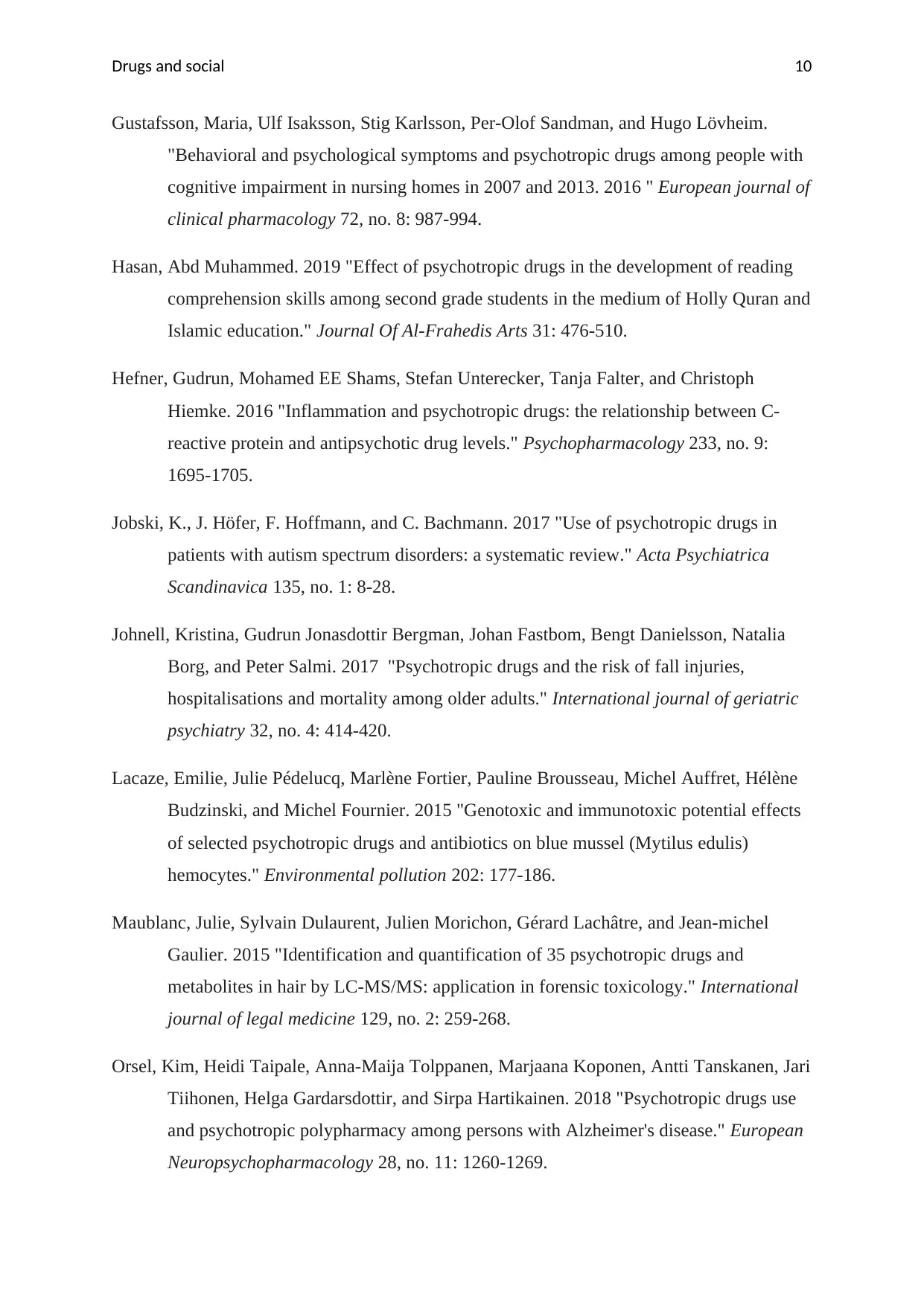
Drugs and social 10
Gustafsson, Maria, Ulf Isaksson, Stig Karlsson, Per-Olof Sandman, and Hugo Lövheim.
"Behavioral and psychological symptoms and psychotropic drugs among people with
cognitive impairment in nursing homes in 2007 and 2013. 2016 " European journal of
clinical pharmacology 72, no. 8: 987-994.
Hasan, Abd Muhammed. 2019 "Effect of psychotropic drugs in the development of reading
comprehension skills among second grade students in the medium of Holly Quran and
Islamic education." Journal Of Al-Frahedis Arts 31: 476-510.
Hefner, Gudrun, Mohamed EE Shams, Stefan Unterecker, Tanja Falter, and Christoph
Hiemke. 2016 "Inflammation and psychotropic drugs: the relationship between C-
reactive protein and antipsychotic drug levels." Psychopharmacology 233, no. 9:
1695-1705.
Jobski, K., J. Höfer, F. Hoffmann, and C. Bachmann. 2017 "Use of psychotropic drugs in
patients with autism spectrum disorders: a systematic review." Acta Psychiatrica
Scandinavica 135, no. 1: 8-28.
Johnell, Kristina, Gudrun Jonasdottir Bergman, Johan Fastbom, Bengt Danielsson, Natalia
Borg, and Peter Salmi. 2017 "Psychotropic drugs and the risk of fall injuries,
hospitalisations and mortality among older adults." International journal of geriatric
psychiatry 32, no. 4: 414-420.
Lacaze, Emilie, Julie Pédelucq, Marlène Fortier, Pauline Brousseau, Michel Auffret, Hélène
Budzinski, and Michel Fournier. 2015 "Genotoxic and immunotoxic potential effects
of selected psychotropic drugs and antibiotics on blue mussel (Mytilus edulis)
hemocytes." Environmental pollution 202: 177-186.
Maublanc, Julie, Sylvain Dulaurent, Julien Morichon, Gérard Lachâtre, and Jean-michel
Gaulier. 2015 "Identification and quantification of 35 psychotropic drugs and
metabolites in hair by LC-MS/MS: application in forensic toxicology." International
journal of legal medicine 129, no. 2: 259-268.
Orsel, Kim, Heidi Taipale, Anna-Maija Tolppanen, Marjaana Koponen, Antti Tanskanen, Jari
Tiihonen, Helga Gardarsdottir, and Sirpa Hartikainen. 2018 "Psychotropic drugs use
and psychotropic polypharmacy among persons with Alzheimer's disease." European
Neuropsychopharmacology 28, no. 11: 1260-1269.
Gustafsson, Maria, Ulf Isaksson, Stig Karlsson, Per-Olof Sandman, and Hugo Lövheim.
"Behavioral and psychological symptoms and psychotropic drugs among people with
cognitive impairment in nursing homes in 2007 and 2013. 2016 " European journal of
clinical pharmacology 72, no. 8: 987-994.
Hasan, Abd Muhammed. 2019 "Effect of psychotropic drugs in the development of reading
comprehension skills among second grade students in the medium of Holly Quran and
Islamic education." Journal Of Al-Frahedis Arts 31: 476-510.
Hefner, Gudrun, Mohamed EE Shams, Stefan Unterecker, Tanja Falter, and Christoph
Hiemke. 2016 "Inflammation and psychotropic drugs: the relationship between C-
reactive protein and antipsychotic drug levels." Psychopharmacology 233, no. 9:
1695-1705.
Jobski, K., J. Höfer, F. Hoffmann, and C. Bachmann. 2017 "Use of psychotropic drugs in
patients with autism spectrum disorders: a systematic review." Acta Psychiatrica
Scandinavica 135, no. 1: 8-28.
Johnell, Kristina, Gudrun Jonasdottir Bergman, Johan Fastbom, Bengt Danielsson, Natalia
Borg, and Peter Salmi. 2017 "Psychotropic drugs and the risk of fall injuries,
hospitalisations and mortality among older adults." International journal of geriatric
psychiatry 32, no. 4: 414-420.
Lacaze, Emilie, Julie Pédelucq, Marlène Fortier, Pauline Brousseau, Michel Auffret, Hélène
Budzinski, and Michel Fournier. 2015 "Genotoxic and immunotoxic potential effects
of selected psychotropic drugs and antibiotics on blue mussel (Mytilus edulis)
hemocytes." Environmental pollution 202: 177-186.
Maublanc, Julie, Sylvain Dulaurent, Julien Morichon, Gérard Lachâtre, and Jean-michel
Gaulier. 2015 "Identification and quantification of 35 psychotropic drugs and
metabolites in hair by LC-MS/MS: application in forensic toxicology." International
journal of legal medicine 129, no. 2: 259-268.
Orsel, Kim, Heidi Taipale, Anna-Maija Tolppanen, Marjaana Koponen, Antti Tanskanen, Jari
Tiihonen, Helga Gardarsdottir, and Sirpa Hartikainen. 2018 "Psychotropic drugs use
and psychotropic polypharmacy among persons with Alzheimer's disease." European
Neuropsychopharmacology 28, no. 11: 1260-1269.
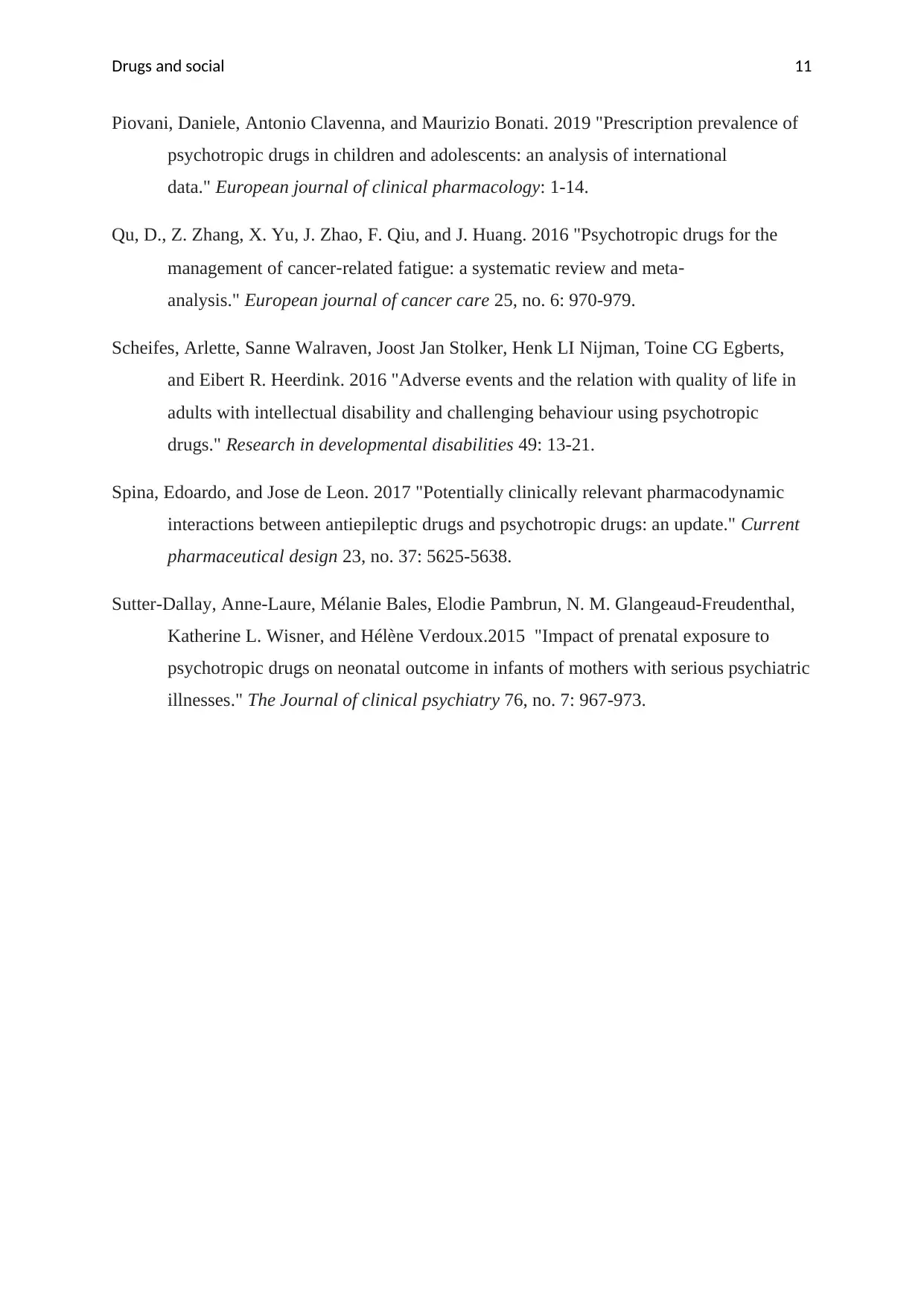
Drugs and social 11
Piovani, Daniele, Antonio Clavenna, and Maurizio Bonati. 2019 "Prescription prevalence of
psychotropic drugs in children and adolescents: an analysis of international
data." European journal of clinical pharmacology: 1-14.
Qu, D., Z. Zhang, X. Yu, J. Zhao, F. Qiu, and J. Huang. 2016 "Psychotropic drugs for the
management of cancer‐related fatigue: a systematic review and meta‐
analysis." European journal of cancer care 25, no. 6: 970-979.
Scheifes, Arlette, Sanne Walraven, Joost Jan Stolker, Henk LI Nijman, Toine CG Egberts,
and Eibert R. Heerdink. 2016 "Adverse events and the relation with quality of life in
adults with intellectual disability and challenging behaviour using psychotropic
drugs." Research in developmental disabilities 49: 13-21.
Spina, Edoardo, and Jose de Leon. 2017 "Potentially clinically relevant pharmacodynamic
interactions between antiepileptic drugs and psychotropic drugs: an update." Current
pharmaceutical design 23, no. 37: 5625-5638.
Sutter-Dallay, Anne-Laure, Mélanie Bales, Elodie Pambrun, N. M. Glangeaud-Freudenthal,
Katherine L. Wisner, and Hélène Verdoux.2015 "Impact of prenatal exposure to
psychotropic drugs on neonatal outcome in infants of mothers with serious psychiatric
illnesses." The Journal of clinical psychiatry 76, no. 7: 967-973.
Piovani, Daniele, Antonio Clavenna, and Maurizio Bonati. 2019 "Prescription prevalence of
psychotropic drugs in children and adolescents: an analysis of international
data." European journal of clinical pharmacology: 1-14.
Qu, D., Z. Zhang, X. Yu, J. Zhao, F. Qiu, and J. Huang. 2016 "Psychotropic drugs for the
management of cancer‐related fatigue: a systematic review and meta‐
analysis." European journal of cancer care 25, no. 6: 970-979.
Scheifes, Arlette, Sanne Walraven, Joost Jan Stolker, Henk LI Nijman, Toine CG Egberts,
and Eibert R. Heerdink. 2016 "Adverse events and the relation with quality of life in
adults with intellectual disability and challenging behaviour using psychotropic
drugs." Research in developmental disabilities 49: 13-21.
Spina, Edoardo, and Jose de Leon. 2017 "Potentially clinically relevant pharmacodynamic
interactions between antiepileptic drugs and psychotropic drugs: an update." Current
pharmaceutical design 23, no. 37: 5625-5638.
Sutter-Dallay, Anne-Laure, Mélanie Bales, Elodie Pambrun, N. M. Glangeaud-Freudenthal,
Katherine L. Wisner, and Hélène Verdoux.2015 "Impact of prenatal exposure to
psychotropic drugs on neonatal outcome in infants of mothers with serious psychiatric
illnesses." The Journal of clinical psychiatry 76, no. 7: 967-973.
⊘ This is a preview!⊘
Do you want full access?
Subscribe today to unlock all pages.

Trusted by 1+ million students worldwide
1 out of 12
Related Documents
Your All-in-One AI-Powered Toolkit for Academic Success.
+13062052269
info@desklib.com
Available 24*7 on WhatsApp / Email
![[object Object]](/_next/static/media/star-bottom.7253800d.svg)
Unlock your academic potential
Copyright © 2020–2026 A2Z Services. All Rights Reserved. Developed and managed by ZUCOL.





